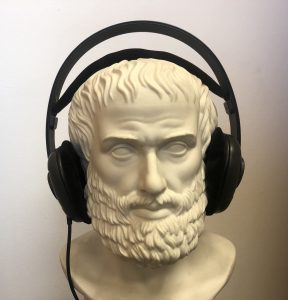Hasnaê Kerach explores Aristotle’s forgotten, and widely known appeals.
2400 years ago, Aristotle introduced a manuscript called “Rhetoric” to the world. It has withstood the test of time and proved to be one of the most influential works on persuasion. Aristotle defined Rhetoric as the ‘faculty of discovering in any particular case all of the available means of persuasion’. He explained that these included several concepts, now known together as Aristotle’s Appeals.
Aristotle’s rhetorical appeals have many applications in life. They crop up wherever you are trying to steer the conversation in your preferred direction. Think about your last pitch, presentation, fundraising or other form of communication where you had to convince your audience to adopt your viewpoint, change their behaviour or grant you the promotion you always wanted. Here, we will explore two of Aristotle’s somewhat forgotten appeals: Kairos and Telos. We will also review his better-known appeals: Logos, Ethos and Pathos.

Kairos
This is the appeal to “Timeliness”. In Greek, Kairos means “opportunity”, “right time”, “season” and “weather”. Kairos is about recognising the individuality and uniqueness of a situation and drawing persuasion support from the timing, atmosphere and the setting of what is happening at that very moment. A good example is seen by looking at how retailers try to influence consumers to buy a certain product leading up to Valentine’s Day or Christmas. It is a call to act now because of the current circumstances.
Unlike the other appeals, Kairos is a dynamic rather than a fixed principle. It demands a high degree of flexibility and agility from the persuader. For example: you have prepared a speech on Brexit for a 90% “pro-Brexit” audience. Just before entering the room to give your speech, the organisers apologise to you informing you that they’ve made a terrible mistake in their brief and in fact, the audience in the room are actually against Brexit and are convinced that staying in Europe is the best option for the UK. In situations like these and regardless of your own viewpoint, if you want to persuade, you will have to adjust your speech to fit the new circumstance. Kairos, in this case, is also about the appropriateness of your tone and making sure that your argument matches the situation.
Telos
This is the appeal to “Purpose” and “end goal”. Aristotle argued that all things – arguments, living beings and objects – have a function or a purpose. Telos informs every aspect of your communication; it is about making sure that your communication as a whole or the built-in arguments are serving a goal. It may be your goal to get hired, or it’s a goal that has been set by your audience. The questions to ask here are: What purpose do these things serve? Are you appealing to the end goal of the audience?
For example, when creating your pitch content, Telos would be the central thread that binds your key messages and arguments together, thus helping you create a more persuasive case. If the purpose of your pitch is to help your client close a gap in their balance sheet, it is very important that you keep this purpose in mind while creating your content; every argument you make is then an elaboration on how you can close that gap supported with additional data and information. In this case, you can compare your key arguments and messages to separate rivers that are all flowing in the same direction and ultimately into the same sea, which is your end goal.
Logos
The appeal to “Logic” and “Reason”. That is, how well you use the ‘text’ of your argument and evidence. Effective arguments will include facts and other supporting details to back up claims and have no logical gaps. The content may include testimony from authorities and will demonstrate your carefulness in choosing and considering evidence. Questions to consider: What is being argued here, or what is your thesis? What facts do you offer to support your idea?
Ethos
The appeal to “Ethics” and “Character”. That is about your trustworthiness and credibility. As a communicator, you can persuade your audience by using your expertise and knowledge on a certain matter, or the reliability and credibility that you have as an individual or organisation. Many companies use this appeal by asking a celebrity to endorse their products. The questions to ask here are: How well do you present yourself as a communicator? Do you seem knowledgeable and reasonable? Do you seem trustworthy? Do you treat opponents and people who may disagree, with fairness and respect? Do you try to establish common ground with the audience?
Pathos
The appeal to “Emotions”. Pathos allows your audience to relate to you or your message at the emotional level. It is about how well you tap into the audience’s feelings, using stories and anecdotes. The main question to ask here is: Do you appeal to the audience’s emotions – feelings of sadness, pride, fear, being young, anger, patriotism, love, justice, excitement etc.? On the other hand, is the speech loaded with facts, figures, and nothing else? Is the emotional appeal effective or overwhelming?
Building compelling content and arguments is a process that requires you to take all these appeals into account. It is worth mentioning, however, that an argument can correspond to more than one appeal and that the above list is not exclusive. There are other persuasion means in the Rhetoric that you could use to strengthen your argument, such as brevity and metaphor.
By Hasnaê Kerach
-
Dillard, J. and Pfau, M. (2002). The persuasion handbook. Thousand Oaks, CA: Sage Publications.
-
Eidenmuller, M. (2019). American Rhetoric: Definitions of Rhetoric. [online] Americanrhetoric.com. Available at: https://americanrhetoric.com/rhetoricdefinitions.htm [Accessed 18 Sep. 2019].
-
Galo, C. (2019). The Art of Persuasion Hasn’t Changed in 2,000 Years. [online] Harvard Business Review. Available at: https://hbr.org/2019/07/the-art-of-persuasion-hasnt-changed-in-2000-years [Accessed 18 Sep. 2019].
-
Kinneavy. J & Eskin, C. (2000) Kairos in Aristotle’s Rhetoric, Sage Publications, Inc.
Download a pdf of the article here:Aristotle’s forgotten appeals

